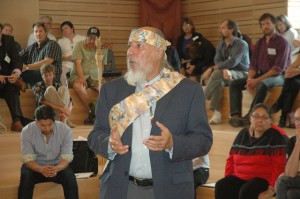Indigenizers stressed, among other things, that First Nations should be hired throughout institutions, not just the First Nations studies department, and that institutions should report to aboriginal councils and that there be aboriginals and elders on the Board of Governors. It was felt that Indigenizing needed to be done by First Nations people to be authentic and to feel authentic; it should be organic and not just a project: “most of these projects are started with grant money, and stop when the money runs out. Grants do not create sustainable services and programs for the students.” (Indigenizers, Workshop II, Group 1). Grants need to fund long term positions – Indigenizers observed that more often than not, First Nations were only included because they are needed for a proposal request. Strategic plans need to include Aboriginal hiring and retention versus contract work; that turnover is high with faculty and staff because the funding isn’t core.
Indigenizers felt that university students should be mentoring high school students, in order to prepare them for the rigours and requirements of Post-Secondary. Indigenizers also felt that the term indigenizing was incomprehensible to many, even across the Province. A suggestion was made by one person that the terminology could be made simpler and easier to understand.
Indigenizers felt that institutions should formulate and follow an Aboriginal hiring strategy as part of policy; that there must be Aboriginal staff in order to properly support the students and to create an atmosphere of safety and trust. A proactive Aboriginal hiring policy would combat the following forms of institutionalized racism: a perception of First Nations people as “too Indian”; lacking in confidence because they speak softly, and therefore unable to fulfill the rigours of the job; barriers to being placed on hiring committees; nepotism at the institution and on the hiring committees; lack of official qualifications, although the potential employee may have extensive experience; and a requirement to speak both French and English, with no requirement to speak indigenous languages. First Nations languages should be articulated as core courses, rather than as electives, so they would not seem to be of lower status or “less than”. University staff were urged to consult with the Aboriginal staff on aboriginal matters, rather than going to the non-aboriginal staff.
Also suggested was to ensure there were indigenous academic resources in the library to which faculty and students can refer.
Indigenizers also felt that it was necessary to have Board and Senior Management visibly champion Indigenization. Agreements between public post-secondary and private Aboriginal institutes should be bolstered, and institutions need to plan ahead for the next ten years and beyond to the next generation. It was asked, “What are we doing today and what will we be doing in ten years?”
Tags: Governance, Indigenizers



Comments are closed.